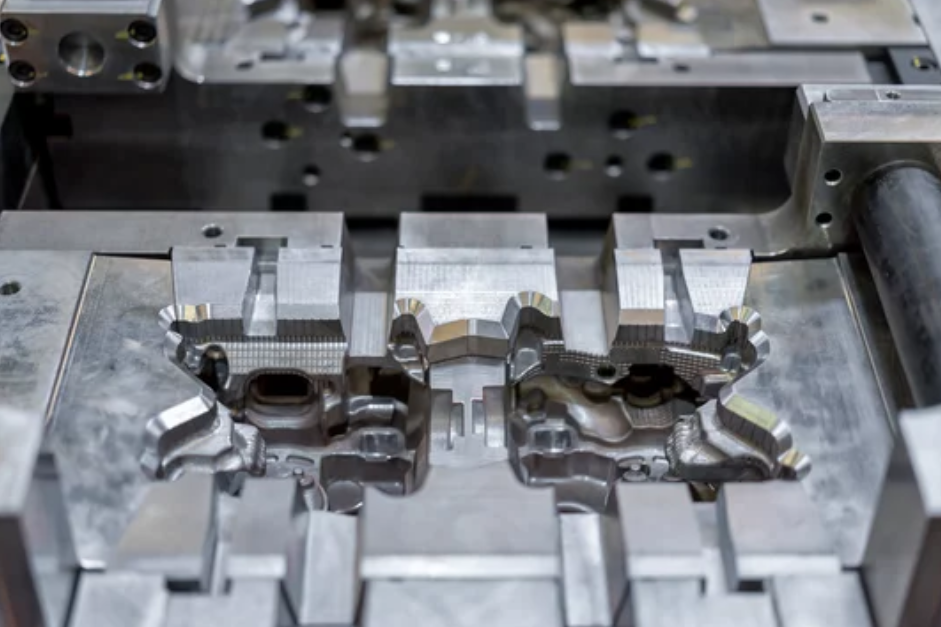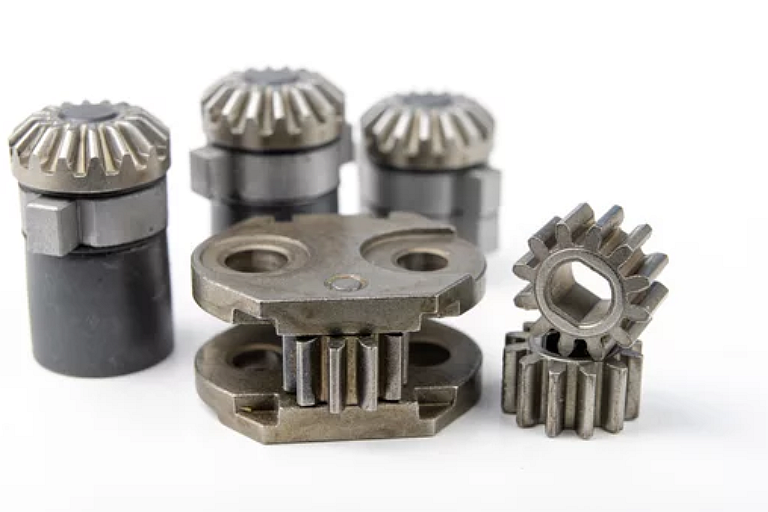Titanium Alloy Metal Injection Molding
Titanium alloy metal injection molding utilizing grades like Ti-6Al-4V, Ti-6Al-7Nb, and Ti-5Al-2.5Fe facilitates the economical production of intricate, net-shape titanium components. It combines the design flexibility of plastic injection molding with the excellent properties of titanium alloys. Key benefits include high strength-to-weight ratios, corrosion resistance, fatigue strength, and biocompatibility. Titanium MIM also enables consolidation of parts, reduced wastage, and manufacturing of geometrically complex shapes not possible with conventional methods. Overall, titanium alloy MIM is cost-effective for manufacturing lightweight, durable titanium components.

Titanium Alloy Optional for MIM
Titanium Alloy Optional for MIM
Ti-6Al-4V (Grade 5):
The most widely used titanium alloy offers an excellent strength-to-weight ratio, corrosion resistance, fatigue strength, and high-temperature capability—an ideal general-purpose alloy.
Ti-6Al-7Nb (Grade 26):
Niobium addition improves corrosion resistance compared to Ti-6Al-4V. They are used for biomedical implants and aerospace components requiring high biocompatibility.
Ti-5Al-2.5Fe (Grade 38):
Iron addition provides better machinability and enforceability. They are used where machining/fabrication of MIM parts is required—an excellent combination of strength and toughness.
Ti-3Al-2.5V (Grade 9):
Lower aluminum and vanadium content gives superior weldability. Suitable for chemical processing applications requiring corrosion resistance and weldability.
Ti-15V-3Cr-3Al-3Sn:
A high-strength titanium alloy used for fasteners and compressor parts in aerospace applications. Provides excellent creep resistance.
Ti-10V-2Fe-3Al (Grade 20):
Good balance of strength, flexibility, and oxidation resistance up to 600°C. They are used for aircraft engine components requiring high-temperature properties.
Ti-15Mo-5Zr-3Al (Grade 21):
Added molybdenum and zirconium provide exceptional corrosion resistance. Used in aerospace fasteners and components needing corrosion protection.
Alloy | Key Features | Applications |
|---|---|---|
Ti-6Al-4V (Grade 5) | High strength-to-weight ratio, corrosion resistance, fatigue strength | Aerospace components, biomedical implants, automotive parts |
Ti-6Al-7Nb (Grade 26) | Improved corrosion resistance, biocompatibility, fatigue strength | Biomedical implants, aerospace hydraulic systems |
Ti-5Al-2.5Fe (Grade 38) | Good machinability, enforceability, strength, toughness | Automotive valves, sporting equipment, racing components |
Ti-3Al-2.5V (Grade 9) | Excellent weldability, ductility, corrosion resistance | Chemical processing equipment, tubing, tanks, pipelines |
Ti-15V-3Cr-3Al-3Sn | Very high strength and creep resistance at elevated temperatures | Aerospace compressor parts, turbine blades, fasteners |
Ti-10V-2Fe-3Al (Grade 20) | Strength, flexibility, and oxidation resistance up to 600°C | Aircraft engine components, automotive turbochargers |
Ti-15Mo-5Zr-3Al (Grade 21) | Outstanding corrosion resistance and stability after aging | Aerospace hydraulic tubing, cryogenic tankage |
MIM-Titanium Alloy Comparison
Carefully evaluating and comparing the properties of different MIM titanium alloys is crucial for identifying the ideal grade for your specific application. By analyzing alloys like Ti-6Al-4V, Ti-6Al-7Nb, and Ti-5Al-2.5Fe across factors such as corrosion resistance, strength, machinability, and high-temperature behavior, you can match the alloy capabilities to your component requirements.
Selecting a MIM titanium alloy optimized for the intended operating conditions ensures your parts exhibit the necessary mechanical properties, performance attributes, and durability. The suitable titanium MIM alloy grade also enables design flexibility and economical production of intricate geometries. With in-depth alloy knowledge, you can confidently choose a MIM titanium material that aligns with long-term part performance, manufacturability, and cost targets. Partnering with Neway provides alloy guidance and testing, reduces risk, and speeds up the material selection.
Chemical Composition
Alloy | Titanium (Ti) | Aluminum (Al) | Vanadium (V) | Niobium (Nb) | Molybdenum (Mo) | Iron (Fe) | Chromium (Cr) | Tin (Sn) | Zirconium (Zr) |
|---|---|---|---|---|---|---|---|---|---|
Ti-6Al-4V (Grade 5) | 90% | 6% | 4% | - | - | - | - | - | - |
Ti-6Al-7Nb (Grade 26) | 87% | 6% | - | 7% | - | - | - | - | - |
Ti-5Al-2.5Fe (Grade 38) | 92.5% | 5% | - | - | - | 2.5% | - | - | - |
Ti-3Al-2.5V (Grade 9) | 94.5% | 3% | 2.5% | - | - | - | - | - | - |
Ti-15V-3Cr-3Al-3Sn | 75% | 3% | 15% | - | - | - | 3% | 3% | - |
Ti-10V-2Fe-3Al (Grade 20) | 85% | 3% | 10% | - | - | 2% | - | - | - |
Ti-15Mo-5Zr-3Al (Grade 21) | 77% | 3% | - | - | 15% | - | - | - | 5% |
Physical and Mechanical
Alloy | Status | Tensile Strength (MPa) | Yield Strength (MPa) | Impact Strength (J) | Hardness (HRC) | Young's Modulus (GPa) | Poisson's Ratio | Elongation (%) | Density (g/cm3) |
|---|---|---|---|---|---|---|---|---|---|
Ti-6Al-4V (Grade 5) | Sintered | 930 | 860 | 25 | 36 | 114 | 0.32 | 15 | 4.43 |
Ti-6Al-7Nb (Grade 26) | Sintered | 900 | 820 | 20 | 35 | 105 | 0.34 | 18 | 4.52 |
Ti-5Al-2.5Fe (Grade 38) | Sintered | 950 | 900 | 30 | 38 | 120 | 0.29 | 10 | 4.48 |
Ti-3Al-2.5V (Grade 9) | Sintered | 860 | 790 | 18 | 33 | 100 | 0.36 | 20 | 4.36 |
Ti-15V-3Cr-3Al-3Sn | Sintered | 1100 | 1050 | 35 | 42 | 125 | 0.27 | 5 | 4.62 |
Ti-10V-2Fe-3Al (Grade 20) | Sintered | 980 | 900 | 28 | 39 | 115 | 0.30 | 12 | 4.54 |
Ti-15Mo-5Zr-3Al (Grade 21) | Sintered | 820 | 760 | 15 | 32 | 95 | 0.35 | 16 | 4.28 |
Key Features and Applications of Titanium MIM Parts
Ti-6Al-4V (Grade 5):
Key Features: High strength-to-weight ratio, corrosion resistance, biocompatibility, and temperature stability.
Application Examples: Aerospace components, medical implants, sports equipment.
Reasons to Choose: Ti-6Al-4V offers unmatched strength and durability, making it ideal for demanding applications. Its biocompatibility and corrosion resistance make it a prime choice for the medical and industrial sectors.
Ti-6Al-7Nb (Grade 26):
Key Features: Biocompatibility, strength and toughness, corrosion resistance, bone compatibility.
Application Examples: Medical implants (hip, knee replacements), dental implants, surgical instruments.
Reasons to Choose: With its biocompatibility and compatibility with human bone, Ti-6Al-7Nb is tailor-made for medical applications. Its strength and toughness further ensure reliable performance.

Ti-5Al-2.5Fe (Grade 38):
Key Features: Moderate strength, elevated temperature stability, excellent corrosion resistance.
Application Examples: Aerospace components, automotive parts, marine equipment.
Reasons to Choose: Grade 38 balances strength and temperature stability, making it versatile for applications where resilience against high temperatures and corrosion is vital.
Ti-3Al-2.5V (Grade 9):
Key Features: Balanced strength and formability, weldability, and corrosion resistance.
Application Examples: Aerospace components, marine hardware, chemical processing equipment.
Reasons to Choose: Grade 9's balance of strength, formability, and corrosion resistance lend well to applications requiring diverse properties.
Ti-15V-3Cr-3Al-3Sn:
Key Features: High strength, excellent fatigue resistance, aerospace applications.
Application Examples: Aircraft components, landing gear, structural parts.
Reasons to Choose: Ti-15V-3Cr-3Al-3Sn's remarkable strength and fatigue resistance make it a staple in aerospace and high-performance applications.
Ti-10V-2Fe-3Al (Grade 20):
Key Features: Balanced strength and corrosion resistance, formability, weldability.
Application Examples: Aircraft components, industrial equipment, marine hardware.
Reasons to Choose: Grade 20's versatile properties and balanced strength make it a reliable choice for various industries and applications.
Ti-15Mo-5Zr-3Al (Grade 21):
Key Features: High strength, excellent corrosion resistance, aerospace and marine applications.
Application Examples: Aircraft components, marine hardware, chemical processing equipment.
Reasons to Choose: With its strength and corrosion resistance, Grade 21 excels in demanding aerospace, marine, and industrial environments.
How to Select Titanium Grade for Your MIM Parts
Selecting the suitable Titanium grade for your Metal Injection Molding (MIM) parts involves carefully evaluating specific requirements and the properties of different grades. Here's a systematic guide to help you make an informed decision:
Define Part Requirements: Determine the critical properties your MIM part demands, such as strength, corrosion resistance, temperature stability, and mechanical characteristics.
Understand Titanium Grades: Familiarize yourself with the properties of each Titanium grade, including Ti-6Al-4V (Grade 5), Ti-6Al-7Nb (Grade 26), Ti-5Al-2.5Fe (Grade 38), Ti-3Al-2.5V (Grade 9), Ti-15V-3Cr-3Al-3Sn, Ti-10V-2Fe-3Al (Grade 20), and Ti-15Mo-5Zr-3Al (Grade 21).
Match Properties to Needs: Compare the properties of each grade to your part's requirements. Select a grade that aligns with the desired characteristics. For instance, choose Ti-6Al-4V (Grade 5) for high strength or Ti-6Al-7Nb (Grade 26) for medical applications.
Consider Application Factors: Evaluate the specific conditions your MIM part will encounter, such as temperature variations, exposure to corrosive environments, and mechanical stress. Choose a grade that can perform well under these conditions.
Industry Standards and Regulations: Verify if the chosen Titanium grade meets industry standards and regulations relevant to your application, especially in aerospace or medical devices.
Consult Experts: Seek advice from professionals in materials engineering or production. Engage with manufacturers like Neway, who specialize in Titanium MIM parts. Their expertise can provide valuable insights.
Prototype and Testing: Conduct prototyping and testing with the selected Titanium grade to validate its performance in real-world conditions. This step helps identify any potential challenges and allows for adjustments.
Cost Analysis: Evaluate the cost of the chosen grade, including material expenses and processing costs. Strike a balance between the benefits the grade offers and its overall cost.
Long-Term Availability: Ensure the selected Titanium grade will remain available for the lifespan of your product. Avoid grades that face supply chain challenges in the future.
Why Use Us?
Neway provides sophisticated, high-quality injection molding services across multiple technologies - MIM, PCM, CIM, and plastic molding services. Skilled in leveraging unique material properties and processes, Neway delivers optimum solutions tailored to customer requirements. Their 30-year expertise and consultative approach enable them to manufacture innovative, reliable parts. Neway helps customers stay competitive and meet product goals.
评论
发表评论